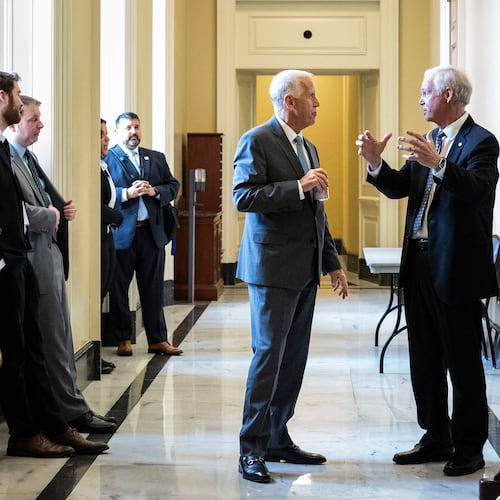In summer 1964, as a 16-year-old boy in rural Georgia, I watched my father, Clete D. Johnson, aggressively prosecute Ku Klux Klansmen for the cold-blooded murder of a black man, U.S. Army Reserve Lt. Col. Lemuel Penn. My father was hardly progressive on racial issues at this time, but violent racists had senselessly murdered a dedicated public servant, and he knew right from wrong.
He stepped boldly into the tumult of the post-Civil Rights Act South:
“Gentlemen, have the courage!” he thundered to the all-white jury, pounding the lectern with his fist, as I watched in awe from the courthouse pews. “Have the courage to do what’s right.”
Sadly, the jury acquitted Penn’s killers. It was a scene that I will never forget, and on one summer night nearly 30 years later, my father’s unheeded challenge to the jury changed the course of my life and that of my family.
On Aug. 5, 1993, I was seven months into my freshman term as a member of Congress representing the mostly rural district in which I had grown up. I was, and still am, a fiscally conservative Democrat who had run on a deficit reduction platform in the elections of 1992. The summer of 1993 had built to a political crescendo surrounding the deficit reduction vote on President Clinton’s first budget.
I generally supported Clinton’s budget plan — both its spending cuts and its nearly equal amount of tax increases, most of which fell on the wealthiest 2 percent of Americans. But I was skeptical about the deal because I wanted stricter controls on the rising costs of health care and fewer taxes on the middle class. I naively believed that we could do better if this bill failed and allowed us to start over.
Like many other skeptics, I spent the entire day in tense discussions with House leadership and with Vice President Al Gore and President Bill Clinton. It was a frantic full court press, but I ultimately told leadership, the White House, and the press that I would vote “no,” and walked to the House to vote.
However, as I listened to Newt Gingrich and Dick Armey cast inflammatory and outrageous predictions about the potential economic effects if the budget passed, my naïveté faded. I realized there would not be an opportunity to craft a better deficit reduction deal.
For Gingrich, this fight had nothing to do with reducing the national deficit; it was all about crippling President Clinton and gaining control of the House.
This realization brought me face to face with another fact: The reasons I had given everyone for my “no” vote were baseless.
My 19-year-old son, who was interning in Washington that summer, sat in the House gallery to watch the historic proceedings that night. Thinking of him watching me, I heard my father’s challenge from 29 years earlier.
I decided I had no choice but to put the interests of my son’s generation ahead of my own political survival.
A House page brought me a note that President Clinton wanted to speak with me again. I went to a cloakroom phone and told him that if he committed to fight for caps on entitlement growth and to make further discretionary spending cuts, I would support the package. Clinton agreed to the commitment, and I added my vote to support the only deficit reduction package that had any realistic chance to prevail. The budget passed by one vote.
Republican opponents and talk radio branded me (along with a handful of other representatives who decided at the last minute to vote “yes”) as the “deciding vote” for Clinton’s “liberal tax-and-spend plan.” We all got our heads handed to us in the 1994 election.
After the difficult loss, two good things happened. First, Clinton kept building on the 1993 down payment on deficit reduction. Second, by the end of the 1990s with the economy rising at record levels, our national budget boasted huge surpluses for the first time in decades.
Unfortunately, the irresponsibility of the early 2000s wasted our surplus and plunged us into an abyss of debt.
Then the financial crisis and the Great Recession deepened the abyss by causing tax revenues to plummet and requiring vast emergency spending to prevent a second Great Depression.
We now are in a debt crisis far worse than the one we climbed out of in the 1990s.
Anyone who can do simple arithmetic knows the elements of the problem: Our discretionary spending (both domestic and defense) is too high, our tax revenues are too low, and our entitlement programs are headed toward insolvency. Solutions are politically difficult, but they are blindingly obvious.
President Barack Obama knows this. So does the Senate’s bipartisan Gang of Six — a group that includes U.S. Sen. Saxby Chambliss, who has shown tremendous leadership and strength on this issue. It appears that House Speaker John Boehner knows it too, although the most radical wing of the House Republican caucus clearly hamstrings his deal-making.
We need statesmen to summon the courage to save this country from catastrophe. For members of Congress, this moment should not be a political game. It is a test of their integrity, and of their awareness that their children — all of our children — are watching.
For their sake, let’s hope that Congress has the courage to do what’s right.
C. Donald Johnson represented Georgia’s 10th Congressional District from 1993 to 1995. He is now director of the Dean Rusk Center of International Law and Policy at the University of Georgia School of Law.
About the Author
Keep Reading
The Latest
Featured


